The sun and earth -> deposition
Deposition
Deposition is the process by which sediments, soil, and rocks are added to a landform or landmass. It is one of the key processes in the geological cycle, which also includes erosion, transportation, and lithification.
Key Points to Remember:
- Deposition is the process of dropping or depositing sediment in a new location.
- It is the opposite of erosion, where sediments are removed from a landform.
- Deposition can occur through various natural processes such as wind, water, ice, and gravity.
- Examples of deposition include the formation of sand dunes, river deltas, and sedimentary rock layers.
- Deposition is an essential part of the rock cycle and contributes to the formation of new geological formations over time.
Study Guide Questions:
- What is deposition and how does it differ from erosion?
- Describe the various natural processes that can lead to deposition.
- Provide examples of landforms or geological features that are formed as a result of deposition.
- Explain the significance of deposition in the context of the rock cycle and the formation of Earth's landscapes.
◂Science Worksheets and Study Guides Second Grade. The sun and earth
Study Guide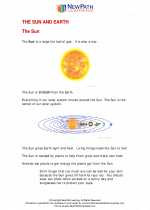 The sun and earth
The sun and earth  Activity Lesson
Activity Lesson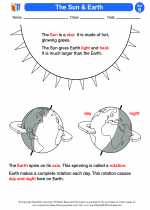 The Sun & Earth
The Sun & Earth  Worksheet/Answer key
Worksheet/Answer key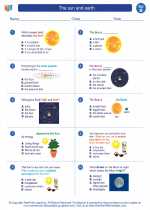 The sun and earth
The sun and earth  Worksheet/Answer key
Worksheet/Answer key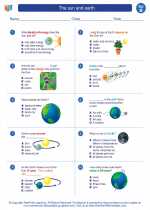 The sun and earth
The sun and earth  Worksheet/Answer key
Worksheet/Answer key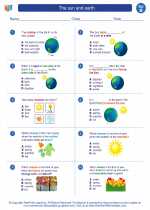 The sun and earth
The sun and earth  Worksheet/Answer key
Worksheet/Answer key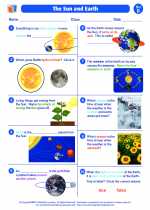 The Sun and Earth
The Sun and Earth  Vocabulary/Answer key
Vocabulary/Answer key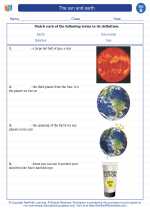 The sun and earth
The sun and earth 

 Activity Lesson
Activity Lesson
 Worksheet/Answer key
Worksheet/Answer key
 Worksheet/Answer key
Worksheet/Answer key
 Worksheet/Answer key
Worksheet/Answer key
 Worksheet/Answer key
Worksheet/Answer key
 Vocabulary/Answer key
Vocabulary/Answer key

The resources above cover the following skills:
Concepts of Earth Science: A student should understand and be able to apply the concepts, processes, theories, models, evidence, and systems of earth and space sciences. A student who meets the content standard should:
Develop an understanding of the cyclical changes controlled by energy from the sun and by Earth's position and motion in our solar system.